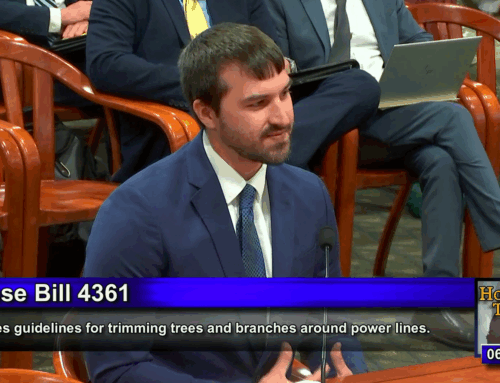Energy reform hearings are underway in the Michigan Legislature, and MECA staff testified in March on behalf of its member electric co-ops.
Craig Borr, MECA CEO, and Art Thayer, energy efficiency programs director, testified before the Senate Energy & Technology Committee on Michigan’s Renewable Portfolio Standards (RPS) and Energy Optimization (EO) initiatives. Both topics were part of P.A. 295, the “Clean, Renewable and Efficient Energy Act,” which established the state’s current RPS. It requires electric providers to achieve a supply portfolio that includes at least 10 percent renewable energy by 2015.
“I testified on Michigan’s current RPS by stating that electric co-ops support renewable energy and understand it needs to be part of our energy mix, but do not support increasing the current 10 percent RPS and believe the ‘in-state purchase requirement’ needs to be eliminated,” Borr explains. Thousands of megawatts of energy are available through wind developments in the Midwest, but Michigan does not have access to them because of the purchasing provision. “Removing that provision could make Michigan more competitive,” Borr said.
On EO, Thayer said MECA members support “helping consumers be wise users of electricity,” but recognition needs to be given to less onerous efficiency targets for smaller utilities. “The fact that nearly 40% of electric co-op consumers statewide are seasonal is an excellent example of why the Legislature should give consideration to changes in the EO program for smaller utilities,” he said. Co-ops cover nearly 60% of Michigan’s geographic area, yet deliver less than 5% of the energy.
”The MECA EO Collaborative has successfully achieved the energy reduction goals outlined in P.A. 295 every year, but MECA believes this goal achievement will become much more difficult and expensive,” Thayer also told the committee, chaired by Sen. Mike Nofs. By the end of 2015, the Collaborative (a group of co-ops and municipal utilities participating in EO) will have invested over $30 million in costs to achieve the energy reductions required by the current statute. The Collaborative has achieved efficiencies valued at nearly $10 million by coordinating and centralizing program planning, implementation, administration, evaluation, and promotional expenses through 2015. The $30 million came from co-op members through a monthly surcharge on electric bills.
MECA has suggested to the Committee that the Michigan Public Service Commission (MPSC) be granted additional authority to help small utilities tailor EO programs to meet their rural consumers’ needs in a more cost-effective way. “A simple way to do that is by having a different set of EO targets for smaller utilities,” Thayer said.
Co-op members use, on average, one-third less energy than electric consumers nationally, which further handicaps co-ops in obtaining energy sales reductions outlined in P.A. 295.




